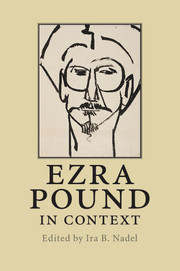Book contents
- Frontmatter
- Contents
- Notes on contributors
- Acknowledgements
- Chronology
- List of abbreviations and note on references to The Cantos
- Introduction
- Part I Biography and works
- 1 Prose criticism
- 2 Poetics
- 3 Translation
- 4 Romance languages
- 5 Letters
- 6 Editor, anthologist
- 7 Education
- 8 Journalism
- 9 Politics
- 10 Economics
- 11 Radio broadcasts
- 12 Law
- 13 Textual criticism
- 14 Archives
- 15 The Lives of Pound
- Part II Historical and cultural context
- Part III Critical reception
- Further reading
- Index
13 - Textual criticism
Published online by Cambridge University Press: 05 July 2014
- Frontmatter
- Contents
- Notes on contributors
- Acknowledgements
- Chronology
- List of abbreviations and note on references to The Cantos
- Introduction
- Part I Biography and works
- 1 Prose criticism
- 2 Poetics
- 3 Translation
- 4 Romance languages
- 5 Letters
- 6 Editor, anthologist
- 7 Education
- 8 Journalism
- 9 Politics
- 10 Economics
- 11 Radio broadcasts
- 12 Law
- 13 Textual criticism
- 14 Archives
- 15 The Lives of Pound
- Part II Historical and cultural context
- Part III Critical reception
- Further reading
- Index
Summary
INTRODUCTION
For the past half-century, Pound's prolific and varied work has presented itself both as a rich landscape and as a perilous terrain for scholarly editors of his writing. There is a pressing need to establish correct and authoritative texts of Pound's poetry, translations, critical prose, musical compositions, reviews, letters, sound recordings, and assortments of archival material. Much of this material presents serious challenges to conventional notions of textual stability and authority, and in some cases confounds all attempts to harness it into published, readable forms. Despite such complexities, the general picture of Pound's influences, contacts, and working materials has come into sharper focus, allowing scholars of Pound's work to base their critical judgements upon increasingly more reliable texts.
But this is not uniformly the case across Pound's writing. Texts in different genres present their own editorial problems and requirements, and questions of textual status and stability will range in urgency and extent across genres. At base, however, the editor's prime tasks remain: to present texts in optimally stable forms, or to account for why stability is not achievable; and to make plain the rationale and methods of the editing process, including (and perhaps especially) situations wherein no obvious alteration or correction has been made to a document beyond its presentation in publishable form.
- Type
- Chapter
- Information
- Ezra Pound in Context , pp. 136 - 147Publisher: Cambridge University PressPrint publication year: 2010

